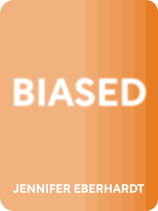

This article is an excerpt from the Shortform book guide to "Biased" by Jennifer L. Eberhardt. Shortform has the world's best summaries and analyses of books you should be reading.
Like this article? Sign up for a free trial here .
Looking for a Biased book review? What are the book’s strengths and weaknesses? Was the book well received by critics?
The book Biased was written by Dr. Jennifer Eberhardt and is about the implicit bias that many Americans have towards black people. This book is the culmination of decades of academic research and is a blend of science and storytelling.
Keep reading for the Biased book review, critical reception, and author background.
Biased: Book Review
Biased: Uncovering the Hidden Prejudice That Shapes What We See, Think, and Do is a practical guide to the science of implicit bias, or the automatic assumptions we make about other people without even realizing it. These biases are the result of natural cognitive processes—we sort people into categories as a mental shortcut to make the world easier to understand. In the United States, antiblack bias is such an ingrained part of the culture that everyone encodes it to some degree, and that implicit bias impacts where we live, work, and study; how we interact with the criminal justice system; and where we focus our attention.
About the Author
Dr. Jennifer Eberhardt is a social psychologist, a professor, and a recipient of the 2014 MacArthur “genius” grant. She earned her Ph.D. at Harvard and taught at Yale before joining the faculty at Stanford in 1998. At Stanford, she co-founded SPARQ (Social Psychological Answers to Real-World Questions), a “do tank” (rather than a “think tank”) dedicated to turning academic research on racial bias into actionable solutions for real-world change. She also regularly works directly with police departments to train officers on how to recognize their own implicit biases and avoid the potentially deadly consequences of acting on those biases.
Eberhardt is considered the reigning expert on the science of racial bias. She’s been interviewed in TIME Magazine, on NPR, and on The Daily Show With Trevor Noah. Her work has been featured in The New York Times and the BBC. In 2020, she gave a TED talk about her research on bias and how companies and police departments can reduce bias.
Connect with Dr. Eberhardt:
The Book’s Publication and Context
Publisher: Viking Penguin
Biased is Dr. Eberhardt’s first book. It is the culmination of decades of academic research on how biases develop and why implicit biases are so hard to combat. In the book, she explores the role of racial bias in major facets of daily life, including policing and the criminal justice system, science, housing, schools, universities, and workplaces.
Historical and Intellectual Context
The book was published in March of 2019, right on the precipice of a renewed wave of protests against police brutality in response to the high-profile police killings of Elijah McClain (August 2019), Breonna Taylor (March 2020), and George Floyd (May 2020). It joined the national conversation about race and racism alongside books like So You Want to Talk About Race by Ijeoma Oluo and How to Be an Antiracist by Ibram X. Kendi. Although those books are more well-known and spent months on bestseller lists, Biased was the first to take a more scientific approach to talking about racism.
The Book’s Strengths and Weaknesses
Biased was well-received by both critics and readers. Forbes praised the book’s blend of science and storytelling, as did other writers of books on racial bias. The book was even endorsed by Vice President Kamala Harris, who read it while serving as a senator. Harris said, “We could not ask for a better guide to understand this reality [of bias] than Jennifer Eberhardt.”
Negative book reviews of Biased center on its limitations. Some inferred from the book’s title that the book would explore bias against all minorities, when it focuses almost exclusively on Black Americans. Other reviewers felt the book is a “beginner’s guide” to the study of bias and may be too basic for those well-read on psychological biases.
Finally, one New York Times reviewer argued that Eberhardt fails to consider alternative hypotheses to explain her findings, such as social deference theory (which suggests that police can and should expect a certain degree of respect from civilians because police officers rank higher in the implicit social hierarchy). Through the lens of social deference theory, police mistreatment of black Americans isn’t the result of racial bias—it’s the result of police officers demanding deference from people they think are beneath them on the social hierarchy. However, black people may be so tired of being harassed by police that they refuse to defer, in which case the officers will use increasingly violent ways to demand respect.
Commentary on the Book’s Approach
Biased begins with a basic overview of how bias works in the brain, then explores how implicit bias impacts different domains of daily life, beginning with police brutality and criminal justice before moving on to topics like housing and education. As an academic researcher, Eberhardt primarily focuses on the association between anti-black bias and crime, so she’s organized the book to focus on her area of expertise first before showing how those same types of racial biases can impact other areas of life. This organization supports her main argument that the most prevalent stereotype about black people in America is the association between black people and crime—and that this particular stereotype is the main root of antiblack bias.
However, Eberhardt made a deliberate choice to address this topic not just as a scientist but through three relevant, intersecting identities: a social scientist, a black woman, and a mother of young black men. Balancing those perspectives makes the book accessible for all types of readers—there’s enough science to be authoritative, and enough humanity to keep you engaged with empathy instead of clinical detachment.

———End of Preview———
Like what you just read? Read the rest of the world's best book summary and analysis of Jennifer L. Eberhardt's "Biased" at Shortform .
Here's what you'll find in our full Biased summary :
- How implicit bias forms in the brain
- Whether or not bias training actually works
- Why there has been a sudden resurgence in white nationalism






